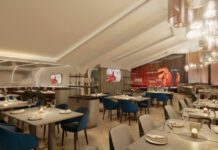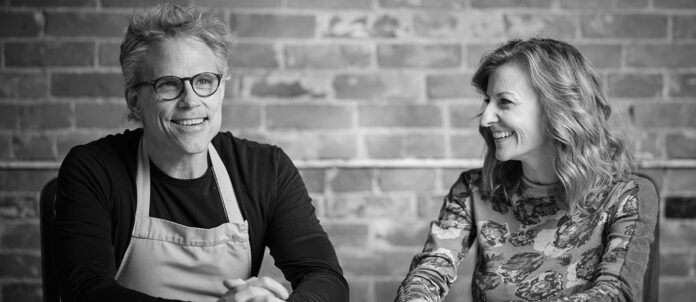Interview by Rosanna Caira
In this episode of Table Talk, Rosanna Caira, editor and publisher of Foodservice and Hospitality speaks with chef Jonathan Gushue and former hotelier, Jennifer Belanger, partners of Gushue Belanger Hospitality Services. The partners, whose combined business experience totals 50 years, in both restaurants and hotels, discuss the challenges and opportunities of launching a new partnership in 2022 post pandemic, while also working to launch two new restaurant concepts — The Gate, and The Vale, in 2024.
Rosanna Caira: How did you come together to form this new partnership?
Jennifer Belanger: I started working at the Bruce Hotel in the middle of the pandemic in early 2021. And climbing out of COVID, it was a struggle looking for staff. So, as I was building the team and trying to flesh out the culinary team, I reached out to Jonathan for consulting purposes. We instantly had a like-mindedness towards hospitality and worked really well together. So, our time there was brief, but we [went] to a dinner in Collingwood, stumbled upon a property and decided we should do this [restaurant] together. The skills that he lends and that I lack complemented each other.
Jonathan Gushue: We got to know each other and our skillsets coming out of COVID. There was a lot we had to do at The Bruce, logistically and Jen was wearing a lot of hats, so that was an opportunity for us to see the abilities of the other.
RC: Your original plans included opening The Vale? What happened to those plans?
JB: It’s in Beaver Valley (Ontario) in a rural area with a lot of natural elements. As you can imagine, converting a mill from 1877 to a restaurant, you jump through a lot of zoning permit municipality hoops. The highlight has been that the municipality and the community is very receptive. But there are building acts and zoning plans you need to navigate, which can take time — a lot more time than we expected. But we moved up here full time in early summer of 2023 and quickly saw that it was going to take a lot longer than we hoped for.
RC: Tell us a little about your restaurant, The Gate. What spurred this restaurant, what’s behind the name of the restaurant and how would you describe what you’re trying to create?
JB: We had people who had moved to the area to join our team and be a part of our vision, but no project. So, the first weekend we discovered Grey Highlands (in Ontario), we ran into a gentleman who owns this beautiful building in Flesherton. It’s 150-year-old building sandwiched between other buildings on a corner, up the street from factories and farms. We were enamored with the charm of the building. Jonathan was coming back from Toronto, and I realized The Vale wasn’t going to open so I sent him a text and I said, ‘no need to respond, but think on your drive about opening a restaurant while we wait to open a restaurant.’ And when he came back, he said we’re crazy. We sort of jumped into this quickly together, but agreed to it and took the property over on a lease in September and spent about three months renovating. So, the project really came from a pivot from what The Vale was supposed to be, but just isn’t yet.
JG: Jen and I both are used to larger volumes, both coming out of dining rooms of anywhere between 80 and 110 seats. This restaurant here, and all our projects, are restaurants that are 22 seats, 40 seats, and 38 seats — they’re a little more manageable — and what we like about that is it gives us the chance to be far more personal with the guests and play a larger part within the restaurant.
RC: How would you describe the menu of the restaurant and what you’re trying to create from a food perspective?
JG: What we wanted was a true farm-to-table restaurant, a very community-minded restaurant that uses the farms and producers around us. We’re starting there and trying to feed the needs of the community, which for the most part, seems to be a lot of people looking for more plant-based and fish options. They say the only rule about opening a restaurant is don’t be like your neighbour, and that’s what we’re trying to do; we’re trying to add to the community, not compete with anyone. The philosophy was to fill an unmet need.
We’re trying to keep a very simple approach to the food, and not really do too much to it — just try to let these products speak for themselves. And then that allows us to just go with the seasons, which allows us a lot of room for change.
After being open a month, we already changed the menu once. We don’t mind pivoting; we’ve got about 24 items on the menu right now and it’s set up in a way that if something’s not working, we can pull that out. But the menu itself doesn’t really follow any specific theme other than farm to table.
RC: How many chefs in your brigade?
JG: We brought in Phillipe de Montbrun as the executive chef of The Gate and he’s going to be the executive chef of all of our properties. We also have a great sous chef coming from Montreal, as well as two more cooks we brought on that came from Langdon Hall. Including me, it’s just five of us, but we’re a very passionate group that has worked incredibly hard. They’ve made the decision to make this their career and it really shows in the food and what we’ve been doing. They’re doing a phenomenal job — we’re small but mighty.
RC: How many seats does The Gate have? Is it open for lunch and dinner and do you offer takeout?
JG: On Fridays, we’re open for lunch and Friday, Saturday, Sunday, we’re open non-stop 12 to 9 p.m. During the week, Monday and Thursday, we’re open in the evenings. There’s a big ski community up here but it’s only been a month, so we’re finding the footing with their habits. But with the non-stop service, guests can be on the hills all day and then come at 2:30 or other off hours to have lunch.
RC: Did you come into owning a restaurant with a different mindset given the precarious state of the industry post pandemic?
JB: There comes a point where you have the jitters from that going into a business. But there’s a point where you just have to take a deep breath, really focus on your own four walls and get back to the essence of what hospitality and good food is. We did have those jitters, but the day we opened, there was a sense of calm with our team, because we prepared and we prepared and we prepared. That’s not to say we aren’t vulnerable to the pandemic aftershocks, if that’s the word for it.
When Jonathan I met, we wanted to serve good food and treat people well; hire good people, pay them well, and treat them well. I don’t want to say the rest takes care of itself, but that’s where loyalty lies. There’s a fatigue and an investment when you have a revolving door of people but we’ve been really lucky.
What we found, by the time we got to this point, was there’s nothing we can do about [the state of the industry], but what we can do is look at it as an opportunity for a re-set in the industry or even in the way we run our lives or our businesses or the way we behave in in in the industry. And the great thing is, the people that are still in the industry now that went through COVID and stayed through it. There’s some really strong, amazing people out there and those are the people we want to emulate. It’s that group of people that are going to bring new, solid and committed people to our industry.
RC: Have you experienced staffing challenges? How are you dealing with labour shortages and finding enough personnel to work for you?
JB: We’ve been very fortunate. One of our managers is [local] from Markdale and we were able to hire two servers from the area. What’s interesting is that we didn’t get a lot of people applying, but the people who did were excellent and we were fortunate to have a team behind us. There’s a great deal of interest [in working here] now that we’re open. We’re seeing a lot of interest from the area, knock on wood. Mostly in the front of house, but we’ve also had interest in the back of house. We’re going to slowly build.
RC: There are industry experts who believe the current restaurant model was flawed and that for the industry to move ahead it needs to be changed. Do you agree that structural changes will have to be made in the business model?
JB: What am I doing differently comes down to culture. And that’s a big word. We don’t measure the bottom line with human resources. Of course, there’s labour, but I’m creating an environment where people feel that they’re adding value.
I remind myself to send a weekly email to say this is where we’re at, this is where we’re going. And sometimes it’s just celebrating the wins. Sometimes it’s acknowledging that yesterday was awful, and we weren’t kind to each other. But let’s turn that page and take a deep breath and move forward. So, I don’t know if I’m doing anything differently, but it has to be a healthy environment. And to say managers aren’t what they used to be, well, are we spending time training managers? We can sometimes just put them in that position because it’s a Band-Aid and they just need to be there. But are we showing them the tools?
JG: It’s about checking in, ensuring the needs of your team are met and knowing how can you assist — and that might be physically or that could just be that they need more spoons. You have to keep those lines of communication open so a cook, or the dishwasher, feels they can come up and say, ‘hey, you know, this is not adequate,’ or ‘I feel uncomfortable with this reasoning here to do said project.’ And we need to make sure everyone feels like they’re a part of this project or this restaurant.
When I was a young cook, we could complain or be upset all we want but we were kind of ignored. That’s just not a way to operate or live or build a team. And that’s what we want— we want to build a big strong group of people to open these restaurants.
RC: The restaurant industry often gets accused of being a toxic environment. How do you, as an operator, ensure your restaurant culture isn’t toxic and that employees have work-life balance?
JG: I grew up in restaurants where I was completely obliterated and yelled at. We can’t do that. But I do think, and I would be very delicate in saying this, that we fall into a bit too much of a swing towards people can be delicate flowers. We do have a job to do and I remind the team that accountability should not be confused with disrespect. Accountability is saying, you’re going to do something and you do it, and we hold each other to that.
JB: At the inception of our company, we talked about our values being kindness, thoughtfulness, generosity, and sense of humour. So, we have this sort of intangible charter with each other, and if we’re off track with those values, what are we going to do to address it with each other? And what are we going to do to bring it on track. So everyday coming in, sort of putting down what’s going on in your brain, outside of work, and, and trying to embody those values. It sounds a bit cheesy. And it’s not always easy to do when in service emotions can run high.
RC: Any advice that you could offer for people who are considering running a restaurant as a partnership?
JB: One of the biggest things we try and stick to is that, although we’ve worked very closely together and we’re friends as well, when it comes to business, it’s got to be business; it’s not personal. We made a commitment that we’re going to listen to the other partner’s ideas and not discount them; listen to what they have to say if there’s an issue, not take it personally and realize that this person is bringing this to you for the betterment of the business.
RC: What keeps you up at night?
JG: One of the biggest things is being able to afford the things you need to run what is a modern restaurant. There are so many amazing products out there that we were looking at — but they cost money and they’re not cheap.
JB: What keeps me up is managing those timelines to get to where we want to be. If we think it’s July, it’s going to be November. And it’s hard when you get excited and just want to make things happen.
RC: What’s been the biggest lesson for you over the last year as you put these two new restaurants on the map?
JG: Asking questions and not necessarily just blindly accepting the answer. It’s learning a lot about zoning requirements and the difference between a municipality requirement and an act or law — they’re very different things and the municipality telling you to do something doesn’t necessarily mean you have to do it. It’s maneuvering through that world that’s been very different for me that now that Jen and I do absolutely everything, and don’t have people to take care of that stuff anymore.
JB: The fastest way is slowly. It’s knowing that you have all the information so you aren’t making decisions under duress. And looking ahead because when you’re bogged down by doing marketing, administrative accounting, and just trying to run your own life and the business of you, it can feel like you’re just spinning, like an alarm clock is in your head. I learned that you need to start slowly. We want all these amazing things for The Gate and The Vale, but we can grow into that in the third quarter. We can add electronic gift cards next Christmas; we can-do old-school ones this year. So, slowly is the way — it’s the fastest way.

















